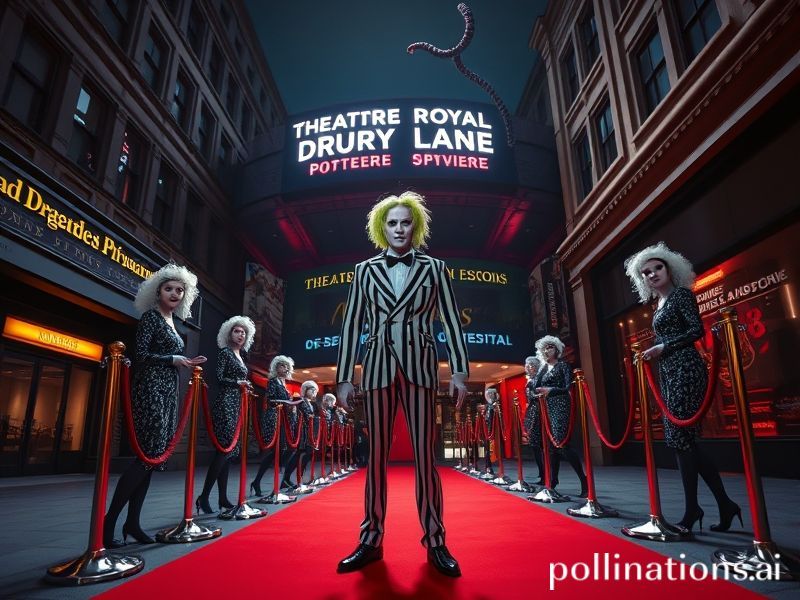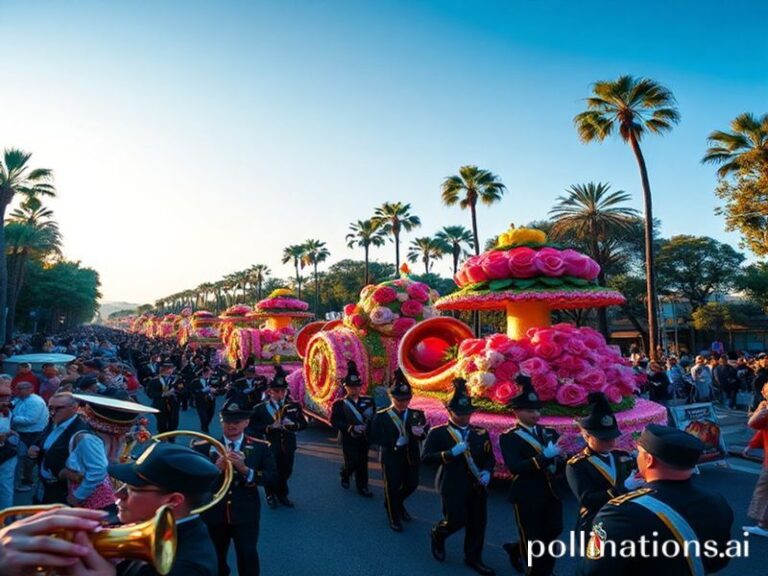Global Audiences Queue for Beetlejuice London: How a Demon in Stripes Became the World’s Therapy Session
A Corpse in Tap Shoes: How Beetlejuice the Musical Became London’s Latest Exorcism of Global Anxiety
By L. Marchetti, International Desk, Dave’s Locker
LONDON—On a damp Tuesday night in Covent Garden, tourists queued past a souvenir shop hawking fridge magnets of Big Ben and Brexit jokes to enter the Theatre Royal Drury Lane, newly refurbished and smelling faintly of paint and existential dread. Inside, a demon in a striped suit high-kicks his way through a chorus line of the recently deceased while the audience—equal parts American honeymooners, Korean TikTokers, and British civil servants pretending this is research for a “levelling-up” policy—laughs at jokes about death, debt, and Delaware. Somewhere in the stalls, an IMF economist quietly tallies the GDP of the afterlife.
The West End resurrection of Beetlejuice the Musical is, on paper, just another U.S. cultural export cashing in on 1980s nostalgia. Yet viewed from a safe distance—say, a missile-test monitoring station in Vladivostok—it looks suspiciously like a global coping mechanism. After four years of pandemics, three wars, two inflation spikes, and one Elon Musk, humanity has apparently decided the most logical response is to dress a Broadway demon in platform boots and teach him jazz squares. It’s grief counselling with a merch table.
The numbers are instructive. Producers spent £18 million renovating the 200-year-old theatre: that’s roughly the annual health budget of a modest Pacific island nation, now diverted to ensure every mezzanine seat has enough legroom for the Dutch. Tickets top out at £250, or the median monthly wage in 38 countries recognized by the UN. Yet shows are sold out through October, proving that while food prices may soar, the appetite for morbid escapism is price-inelastic.
Cultural attachés from three continents report back that Beetlejuice offers a surprisingly accurate map of the current geopolitical terrain. The plot—dead couple loses house to yuppie gentrifiers, hires bio-exorcist, accidentally invites sandworms—mirrors the global housing crisis, gig-economy precarity, and whatever is happening in Australia. Meanwhile, the titular ghost’s catchphrase “It’s showtime!” scans as either a promise or a threat, depending on whether you’re watching from the EU, where “showtime” means subsidised theatre, or from a submarine cable repair ship in the South China Sea, where it means live-fire drills.
The production’s carbon footprint is its own subplot. Scenery flies in from a warehouse in Belgium, costumes are dyed in Morocco, LED panels programmed in Shenzhen. Each performance consumes enough electricity to power a Ghanaian village for a week, which the marketing department offsets by planting three trees somewhere discreetly unphotographable. Greta Thunberg, asked for comment, reportedly rolled her eyes so hard seismologists registered a 2.1 in Uppsala.
Still, the show’s real export is emotional software. Audiences leave humming “Day-O,” a calypso anthem about unpaid labour originally sung by dead Jamaican dockworkers in 1988. Thirty-six years later, the same tune is lip-synced by investment bankers on the Jubilee line, proving that cultural appropriation, like death itself, is non-partisan and tax-deductible. In Seoul, karaoke bars report a 400% spike in the song; in Lagos, DJs mash it up with Afrobeats and call the remix “Banana Republic.” Somewhere, Harry Belafonte’s ghost files a class-action lawsuit for posthumous royalties.
The cynic’s conclusion is obvious: Beetlejuice is not a musical; it’s a seance for late capitalism, summoning the ghost of Tim Burton to reassure us that decay can still be choreographed. The optimist’s take is equally stark: if the planet is going to hell, at least it’s going with jazz hands.
Either way, the bar queues are long, the souvenir programs cost £15, and the fire exits are—fittingly—clearly marked. The show runs eight times a week until the Thames finally reclaims the city, or until audience fatigue sets in, whichever comes first. My advice? Buy the ticket, take the ride, and tip your usher—she’s probably on a zero-hour contract, and the afterlife, like this theatre, is strictly standing room only.







